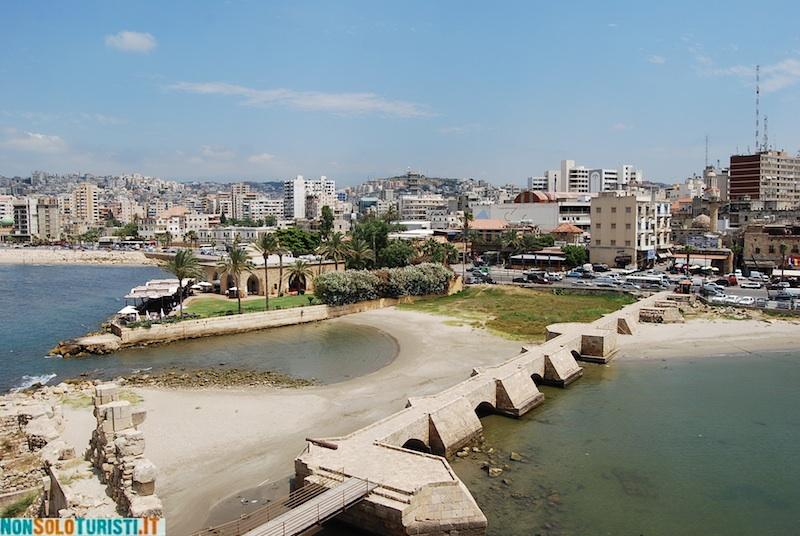It’s already 10 pm when my plane from Cairo arrives in Beirut. The modern airport of the Lebanese capital welcomes me with soft lights and classy stores. Nothing points to the dramatic war against the Israeli invasion which only ended in 2006, nor to the Sirian crisis whose spiral of terror will hit Lebanon two weeks later with three suicide bombs in just a few days.
I allow a taxi driver to escort me to his car. As usual, he has no idea of where my place is located and once we get there after a few phone calls, it takes me about 20 minutes of irritating talks just not to get ripped off by his preposterous bill.
The address he reached with so much trouble was Hostel Beirut, Beirut’s first hostel. The place was founded by Kristian Paulse, a Danish who thought it worth not only to spend his days in Lebanon but also to do something worth in the meanwhile. So he started an NGO, opened the hostel and launched a recycling project.
The recycling project is dually beneficial: on one side it addresses the complicated issues of sustainable waste management in Beirut, on the other it opens positions for unqualified manpower, which Kristian offers to Syrian refugees whose numbers cross the borders in hundreds to escape the horrors of the war.
Beirut is a lively and charming town, but it is not enough to get a satisfactory picture of Lebanon. This is the only country in the Middle East where Christians and Muslims share the political power according to a confessional parliamentary democracy. Therefore, after a quick tour of Byblos, I decided to rent a car with some more guys met at the hostel and to explore a bit more southwards.
Our first stop was Sidon (Sayda), in the South Governorate. In Genesis, Sidon was the son of Canaan, who was Noah’s grandson. And in modern Arabic the term sayda means ‘fishing’.
Sidon is a pretty coastal town and we are immediately attracted by the Sea Castle built by the crusaders. Nowadays there is just its empty shell, but it still leaps romantically towards the sea.
Roaming in the dark alleys of the old town, we start looking for accommodation. Lebanon’s official language is Arabic, but the people talk a local dialect which holds a solid barrier against our attempts to get some information. Luckily many people also talk English or French, so we reach somehow an old Christian cloister turned hostel, the Couvent de Terre Sainte et Paroisee Latin. It’s the only place under 40 US dollars, so we get a room without second thoughts and then head for dinner in one of the indiscernible restaurants in town.
The next day we spend some time hanging in the local military base: travelling towards south often requires a special pass to enter the area still under control of Hezbollah’s troops, but we only want to get as far as Canaan and we soon find out we need no pass at all.
Canaan is one among many places whose name comes from the biblical geographic region where the famous weddings witnessed Jesus’ first miracle. Of course, this episode produced a frenzy run to become ‘the place of’, and here the result is a cave decorated as during Christmas whose connection with the Biblical wedding is still a mystery to us.
Far less frivolous, instead is the sight of the devastation brought by the war against Israel: buildings burned to the ground, holes in the streets, even an old abandoned tank. We feel guilty being a bunch of thoughtless tourists in a place that witnessed so much suffering and pain. While we silence our consciences on our way to Tyre (Sur), we cross a convoy of blue helmets, as to remember us that tragedy is never too far from a place it visited before.
At the end of the 40s, after Israel’s declaration of independence, Tyre welcomed a great number of Palestinian refugees. In the 70s and the 80s the civil war affected heavily the town, which later also came under Israeli occupation. As it wasn’t enough, 2006 was the year of the bombings.
As for us, only vaguely conscious of the suffering surrounding us in time and space, we find a bay for a swim and get a beer in front of the beach. And allow the welcoming smile of Tyre’s people to wash away our guilt and our concern.
A degree in journalism and a professional limbo ranging from press offices to newspapers, magazines and finally the web. I lived in Verona, Zurich, London, Cape Town, Mumbai and Casablanca. I hate flying and I love jodel music. And when I grow up I wanna be a cosmonaut.

